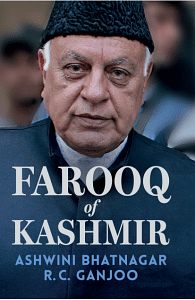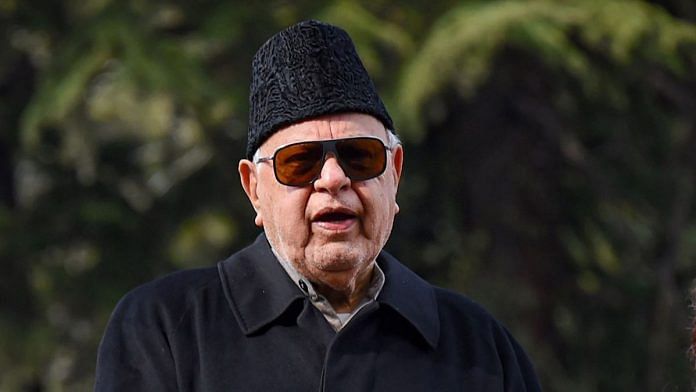Sheikh Abdullah began his last presidential speech. “After 50 years,” he said with his typical flourish, “I get a chance on this historic moment to transfer to the younger generation the trust handed over to me by martyrs—I lighted this torch, and many a storm could not extinguish it until today when (I) transfer (it). Fervently, I hope that Dr Farooq shall prove worthy of the trust. I transfer my presidency to him.”
He then, ironically, harked back to the history of the Congress Party to justify the ‘crowning’ of his son. He recalled the moment when, at the 1929 session of the Indian National Congress, Pandit Motilal Nehru passed the reigns of leadership to his son Jawaharlal.
Moti Lal Nehru, also a Kashmiri, had quoted from 13th century Persian poet Sheikh Saadi, “If the father doesn’t accomplish the task, the son can,” as a reason for the political succession. The Sheikh did likewise.
Jawaharlal’s succession was through a common consensus among Congress leaders. But public enthusiasm notwithstanding, the moment of transition for Farooq was a fractured one. Sheikh Abdullah had bequeathed leadership to the young dynast without getting his seasoned colleagues fully on board. The discussions—polite and discreet—led to a delay of about five months in the Sheikh casting the dice in favour of Farooq.
Also read: Superstar ‘Rajkumar’ is more than a moral icon for Karnataka. He’s an intimate presence
The primary dissent to the son’s supremacy was from within the family itself. G.M. Shah, the party’s strongman and the Sheikh’s son-in-law, who was also the Works Minister in the State Cabinet, was unhappy at being overlooked for the job. Shah’s nephew,
Mohiuddin Shah, general secretary of the NC, was miffed too. He was in direct competition for political largesse with Sheikh Nazir, the Sheikh’s adopted son and the provisional president of the party. Nazir was making noises, too. “State politics has entered a new phase and the generation gap is to be narrowed down in the interest of the party. Unfortunately, our leaders have left the youth uneducated and untrained in all respects,” he said days before Farooq’s elevation. He did not think the Sheikh had made the right choice. Farooq was still ‘untrained’.
Farooq threw in his lot with young leaders as soon as he took over. He made it clear that he needed to replace the old with the young. “I will induce a larger number of youth to join me in the organizational set-up,” he said.
The party’s old guard did not take the statement kindly.
Farooq retreated and tried to play both the sides. “I shall be combining old and new together. Respect for the elders can never die, and the youth can’t be ignored,” he said in a conciliatory tone even as he was raring to break loose from a party hierarchy largely composed of old loyalists who owed allegiance to his brother-in-law G.M. Shah.
Shah had consolidated his hold over the party network in the six years during which the Sheikh Abdullah government was in power, following the Indira-Sheikh Accord of 1975. He had shadowed the Sheikh closely, and in the eyes of the NC workers, he was the Sheikh’s natural successor. But with Farooq’s coming, their hopes had been dashed; however, the question of who would take over after the Sheikh as Chief Minister was still open. The Sheikh occasionally hinted at Shah as a good choice for the position in an attempt, perhaps, to preserve the peace in the household.
Apart from party wrangling, Farooq faced an imminent threat from the dominant opposition party in the State—the Congress. It was in power at the Centre and virtually controlled the political process in the Valley. Farooq remembered well that his father was unceremoniously ousted from power and from the State by the Congress thrice—from 1953 to 1964 (11 years) the first time; from 1965 to 1968 (three years) the second; and for 18 months for the third time in 1971–72 when the Indo-Pak war broke out. He was allowed into the State after he signed the Indira-Sheikh Accord of 1975 in which he gave up his demand for plebiscite in Kashmir. Farooq was also well aware that though the Abdullahs needed the Congress’ support to stay in power, it could not be trusted.
The relationship between Congress (I) (as the Congress was then known) and the NC was, therefore, one of a strained friendship. They tried to bury the hatchet for good, but hostility erupted frequently between the two.
Also read: How Indian State produced propaganda films to promote Second Five-Year Plan
At the August 21 rally too, crowds gave vent to their feelings against the Congress (I) when they raised ‘Where is Congress? Where is Congress?’ slogans while Farooq was being installed as the party chief. The Congress represented the Centre. The Sheikh had carefully cultivated an anti-Centre public stance while simultaneously emphasizing ‘personal friendship’ with the Nehru-Gandhi clan. It was a tightrope walk, but it served an important political purpose for the Sheikh.
Farooq intervened quickly that day to calm the crowd. “I am totally for conciliation and not for confrontation with the Centre and all others. Confrontation leads to destruction as was witnessed in 1947 when India and Pakistan confronted each other.”
Predictably, he also brought the personal equations between the Abdullah and the Gandhi families into the mix. “Rajiv Gandhi telephoned me and wished me well. You know, there has been a life-long relationship between Pandit Nehru and my father, and also with the late Feroze Gandhi and Mrs Gandhi. I want to further my friendship on a similar pattern with Rajiv.”
But before he could clarify the issue, his father burst out against the national broadcasters—Doordarshan and All India Radio. He accused them of not covering the ‘historic occasion’ of Farooq’s installation in full measure.
Moved by the frenzied accusations of his father against the Central government, Farooq rose, turned towards his father, and exclaimed dramatically, “I will not be your son if I do not shake all of India.”
He lived up to the promise in later years.

This excerpt from ‘Farooq of Kashmir’ by Ashwini Bhatnagar and R.C. Ganjoo, has been published with permission from Fingerprint Publishing.



